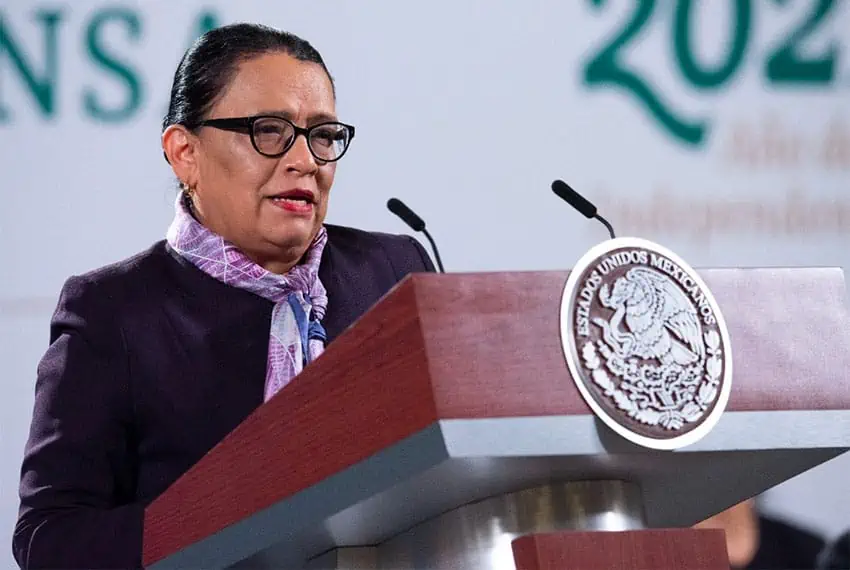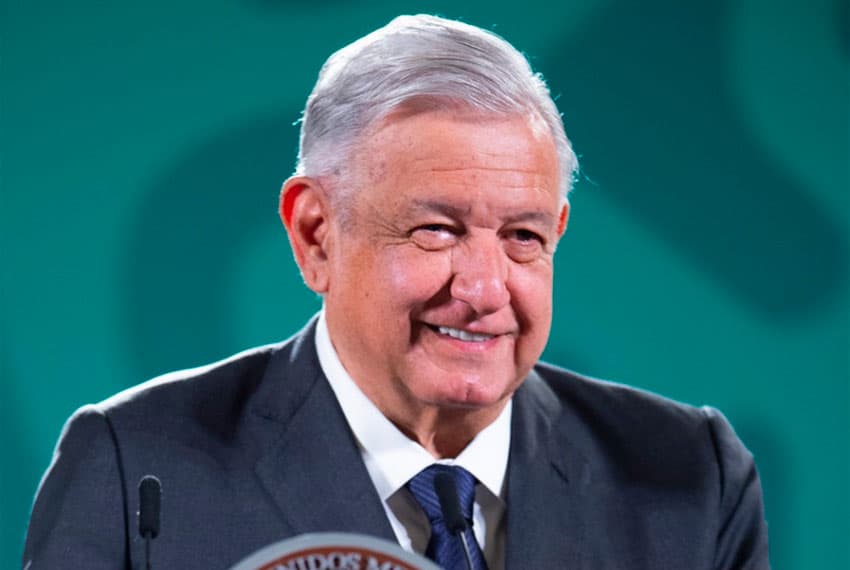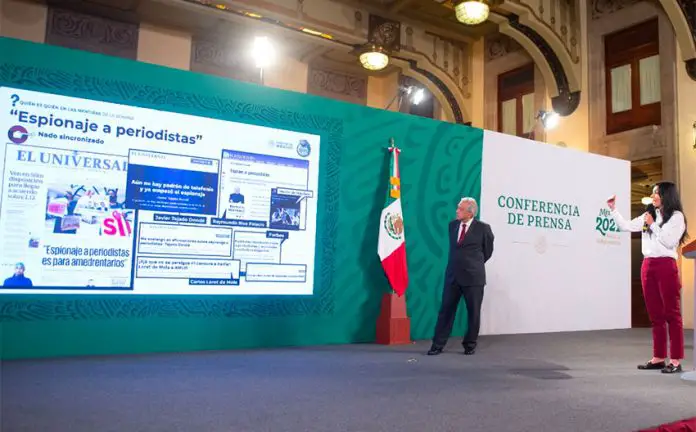This week marked three years of President López Obrador’s political project, which he terms The Fourth Transformation. Central to the mission is the elimination of corruption from political life, for which transparency is deemed critical. That’s where the morning news conference come in.
Sporadically enlightening and rarely dull, the mañaneras have become spectacle in their own right. Here’s a roundup of the week’s most eye-catching moments.
Monday
The government’s projects reported smooth progress on Monday, including the Maya Train, but trouble was afoot in the media. One newspaper had published two damaging stories early in the day. Safety information for the train’s construction, it claimed, had been withheld in the search for funding, and private companies had said the timeline for completion was unrealistic.
Security Minister Rosa Icela Rodríguez Velázquez entered to give an update on femicides. She didn’t shirk her public duty: femicides had risen 7.1% in annual terms; eight states accounted for 57.4% of investigations.
A cutting question came from the floor about the August 1 public referendum. It will ask if past presidents should be investigated for corruption. The journalist had come prepared: “Article 35 of the Constitution, which establishes the right to consultation, in its eighth section, in paragraph five, establishes that the consultation must be carried out on the same day as the federal elections,” he said. So why hadn’t the question been put to voters on June 6?
“When the initiative was sent for the consultation, it was proposed to be held on the day of the election; however, members of the opposition bloc didn’t accept it,” the president coolly clarified.
Tuesday
The Covid-19 report opened proceedings on Tuesday: case numbers were predicted to be up 15% by the end of the week.
A question regarding the delivery date of cancer medications provoked a rant against media outlets for remaining silent under the old regime, when the suppliers of medications “prospered off the health of the people.”
Speaking of the Spanish newspaper El País, the president said, “It’s a Spanish publishing house dedicated to protecting Spanish companies, which were the ones that dominated in Mexico … It was like the second conquest. The Spanish companies came and seized Mexico as a land of conquest.”

He named petrol company Repsol, construction company Obrascón Huarte Lain and electricity company Iberdrola as three offenders. “[Iberdrola] even committed the offense of taking former president Calderón to work as a consultant … A mockery,” he declared.
Then, a pause, for a plea to Sonora. As the clock struck 9:00 a.m. in Mexico City it was only 7:00 a.m. in Sonora, and those tuning in from the northwestern state were implored by the president to get vaccinated. Getting the north of the country vaccinated has become a priority for the government, which hopes to convince U.S. officials that it’s safe to reopen their shared border.
Wednesday
Birthday celebrations kicked off the conference on Wednesday. Still in its infancy, the National Guard had reached two years of age.
Then, something new. In a move that caught journalists off guard, the so called “who’s who of lies,” or the fake news patrol, was given its first airing. Morena party insider Ana Elizabeth García Vilchis had been handed the honor of delivering the weekly reports that aim to round up media misinformation about the administration.
“The Reuters Institute shows that Mexico is at the lowest level of trust toward the media since 2017, going from 55% to 43%,” she said, showing her trust in at least one media outlet.
Claims in the media, some clearly erroneous, were read out and swiftly rebuffed. Last week, a newspaper alleged that journalists were being spied on by the administration. The story was incorrect, García informed, because the president had said so: “Here on June 24, the president of the republic affirmed that it is false that reporters and columnists are being investigated and spied on,” she said.
Later, one media figure was given unusually high praise. Political cartoonist Antonio Helguera, who had died on June 25, received a tribute from the president. “All human beings contribute something, but there are those who are essential … It will be very difficult to replace him because he was a good citizen, a patriot and a person who defended just causes,” the president said.
Thursday
In a highly unusual development, there was no mañanera on Thursday. Instead, a ceremony of sorts to mark three years in power, referred to officially as “the third year of the historic democratic triumph of the people of Mexico.”
In actuality it meant a long speech from the president, and no space for questions from journalists.
The big themes were tackled. In the years of a global pandemic, the government had fared well on the health front, the president said. “Our country is not … at the top for deaths from Covid,” he said. Mexico, for the record, is in the top 1% of countries for mortality from Covid-19.

AMLO, as the president is commonly known, added that the administration’s record stood up on crime too. No new criminal gangs had been formed in his term and throughout the election season there had been no “massacres.” In Guerrero, he said, no electoral candidate had suffered acts of aggression.
By comparison, 152 acts of aggression were recorded in Veracruz.
Friday
The fake news patrol two days earlier had ruffled a few feathers. The UN said the feature was an attack on human rights, according to one journalist.
“Well, that is a very expedient interpretation on the part of those who don’t want there to be any debate of ideas … they just want to have a monopoly of the truth … that is the most undemocratic thing possible,” the president replied.
One issue came up that was of indisputable national importance. Tortilla prices were on the rise with the price per tonne of flour going from 1,500 to 1,600 pesos (about US $76 to US $81).
“Twenty-five years ago, 30 years ago, a minimum wage afforded 50 kilos of tortillas. When we came to the government, a minimum wage was six kilos of tortilla,” the president said.
“Look at what [former presidents] Salinas and Zedillo and Fox, Calderón and Peña did … look how the minimum wage deteriorated,” he added.
Soon after, AMLO called curtains on the final mañanera of the week, and dashed off to pack his bags for a weekend trip to Sonora.
Mexico News Daily
